Frequently Asked Questions
The issues surrounding COVID-19 vaccines are broad and also deep and complex. Many of you have shared your questions with us, which we have presented to various experienced educators, theologians, researchers, and scientists. We continue to learn more about COVID-19 on a daily basis, so these are provided as a starting point to continue learning. The Seventh-day Adventist Church embraces a wholistic approach to understanding these issues, as noted in our Values.
Q: Please discuss concerns with antibody enhancement and vaccine enhanced diseases with the COVID vaccine.
The aim of any vaccine is for the body to make antibodies that neutralize the virus before it has a chance to get into the cells of the body. It is possible for the body to make antibodies that, instead of neutralizing the invader, enable the virus to enter the cells at an increased rate and, therefore, increase disease potential. This can happen with vaccines and viruses. Vaccine makers were very conscious of this possibility when they set out to make the vaccine and, as a result, made sure that the protein that would be made in the body from the vaccine was of a particular shape so as not to produce antibody dependent enhancement (ADE). There has been no evidence that antibody enhancement is occurring with the current round of vaccines and SARS-CoV-2. If ADE were occurring, you would see worse disease in those vaccinated compared to those not vaccinated. In reality were are seeing the opposite. Currently, in the US greater than 90% of the severe cases of COVID-19 being admitted to the ICU are patients who have not received the vaccine.
Response by Roger Seheult, MD, Associate Clinical Professor at the University of California, Riverside School of Medicine and Assistant Clinical Professor at the School of Medicine and Allied Health at Loma Linda University
Q: Why were people with autoimmune health issues told that they should not get the vaccine in the trials?
That is how clinical trials are set up. After the early phases of testing, they include those with other serious health issues. The first clinical trials have exclusion criteria that are meant to protect the vulnerable, including those with immune compromise or immune suppression treatment, those with autoimmune disease, history of anaphylaxis or angioedema, pregnancy, lactation, cancer, serious psychiatric illness, bleeding disorders, chronic respiratory or cardiovascular diseases, severe obesity, alcohol abuse, and injection drug users. After the initial phase 1 and 2 trials are complete establishing safety, the exclusion criteria become less restrictive in phase 3. Now hundreds of millions have received the vaccines with extensive reporting systems. The vaccines have been found to be safe for all groups.
Response by Jeffrey Kuhlman, MD, Senior Vice President and Chief Quality and Safety Officer, AdventHealth
Q: Does the spike protein contain bat DNA? What proof do we have that they do not contain a microchip?
The spike protein is made of protein and there is no DNA. There are no bat-derived ingredients in any of the vaccines. See response to question on “mRNA Technology” for more information on DNA, RNA, and proteins.
There is no technology to make microchips smaller than a grain of rice, hence it would be impossible to put a microchip into a vaccine vial or needle.
Response by E. Albert Reece, MD, PhD, MBA, Executive Vice President for Medical Affairs, UM Baltimore, John Z. and Akiko K. Bowers Distinguished Professor, Dean, University of Maryland School of Medicine
and
Wilbur H. Chen, MD, MS, FACP, FISDA, Professor of Medicine, University of Maryland School of Medicinem Chief, Adult Clinical Studies section, Center for Vaccine Development and Global Health (CVD), Director, UMB Travel Medicine Practice
Q: Can you explain breakthrough infections. If you’re going to get COVID anyway, why get the vaccine?
Breakthrough infections are when an already vaccinated person gets infected. This is expected to occur with any vaccination program since no vaccine is 100% effective at preventing infection. Most of these cases are asymptomatic or have mild symptoms only, and are rarely sick enough to need hospitalization. So it is still valuable to receive the vaccine to prevent severe illness and death. We are continuing to learn more about who may be at higher risk of experiencing a breakthrough infection.
Response by Richard Hart, MD, MPH, President and CEO, Loma Linda University
Q: All three vaccines available in the United States rely on our own cells to translate mRNA strands into the spike protein structures. How common is it for vaccines to employ our own cells to construct antigens?
This is incorrect. Only two of the three currently EUA approved vaccines use the mRNA technology. The third vaccine is a nanoparticle vaccine.The Covid vaccines are the first set of mRNA vaccines to be EUA approved. Prior mRNA vaccines were developed for other emerging infections (zika and ebola) but were not advanced to the late development stage because there was not the public health urgency of a pandemic.
Q: Are you concerned about increased autoimmune risk from this vaccine model?
No evidence of autoimmunity has been observed after hundreds of millions of doses have been administered.
Q: Are you concerned about decreased efficacy from this vaccine model?
All vaccines, no matter which type of technology is being used, have the risk of decreased efficacy over time. The “older” technologies for vaccines such as the Chinese killed whole virus vaccines (based on the decades old way of making vaccines) has lower efficacy than the mRNA and virus-vectored vaccines being used in the U.S. We have now observed >6 months of very good efficacy with the mRNA and virus-vectored vaccines.
Response by E. Albert Reece, MD, PhD, MBA, Executive Vice President for Medical Affairs, UM Baltimore, John Z. and Akiko K. Bowers Distinguished Professor, Dean, University of Maryland School of Medicine
and
Wilbur H. Chen, MD, MS, FACP, FISDA, Professor of Medicine, University of Maryland School of Medicinem Chief, Adult Clinical Studies section, Center for Vaccine Development and Global Health (CVD), Director, UMB Travel Medicine Practice
Q: Please explain how the Jansen (J&J) vaccine is effective when it is one shot, not two.
The J&J vaccine was studied as a single dose vaccine and a 2-dose vaccine; the 2-dose study (called ENSEMBLE-2) is still being performed, but is anticipated to definitively demonstrate improved efficacy compared to the single dose. Nonetheless, the single dose J&J is very good at preventing hospitalization and deaths. The Astra Zeneca vaccine (a 2-dose vaccine) and J&J vaccine are both very similar to each other and use the virus-vector approach to make the vaccine.
Response by E. Albert Reece, MD, PhD, MBA, Executive Vice President for Medical Affairs, UM Baltimore, John Z. and Akiko K. Bowers Distinguished Professor, Dean, University of Maryland School of Medicine
and
Wilbur H. Chen, MD, MS, FACP, FISDA, Professor of Medicine, University of Maryland School of Medicinem Chief, Adult Clinical Studies section, Center for Vaccine Development and Global Health (CVD), Director, UMB Travel Medicine Practice
Q: If we are fearfully and wonderfully made by God (Ps. 139:14), am I showing a lack of faith by taking the vaccination, rather than relying on “natural” remedies like rest, exercise, hydrotherapy, and vitamins?
It is not a lack of faith to make use of valid medical science in the treatment of disease. Rather, it is a thoughtful application of knowledge that God has graciously given through careful research and study. Vaccination is not actually a treatment for a disease, but rather is a preventative, triggering the body’s natural immune system to be ready if you become infected. As such, it works with the natural remedies of fresh air, sunlight, water, rest, exercise, proper diet, abstemiousness and trust in divine aid, to strengthen the body to resist disease.
Responses by Tom Shepherd, PhD, DrPH, Senior Research Professor of New Testament Interpretation and Director, Greek Manuscript Research Center, Andrews University Seminary
Q: Why is there no full disclosure of any potential risk? And why are the blood clots being brushed aside rather than given a fair examination by the media and medical “experts”?
When taking the COVID-19 vaccine, many distributing organizations have recipients signs disclosure before getting the vaccine. A summary of these can be found here.[1] There have been issues specifically with the Johnson & Johnson (Jannsen) COVID-19 vaccine and blood clots. These were not brushed aside but rather paused the vaccine campaign for almost two weeks in April 2021. After an investigation of the 6 cases (out of 6.8 million doses given by that point), it was determined that the vaccine was safe to continue. Realize, that, according to data, the incidence of blood clots in COVID-19 in the ICU approaches 20% and so giving the vaccine might actually lower the risk of blood clots in a population. Here is a great graphic demonstrating the number of events per 100,000 for both the Pfizer vaccine and SARS-CoV-2.[2]
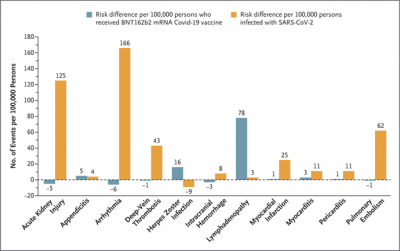
Response by Roger Seheult, MD, Associate Clinical Professor at the University of California, Riverside School of Medicine and Assistant Clinical Professor at the School of Medicine and Allied Health at Loma Linda University
Q: Can my employer or the school I attend request my vaccination status? Is that a violation of my rights? What about HIPAA?
HIPAA applies to covered entities, meaning healthcare providers, health plans, healthcare clearinghouses and their business associates. If an employer is not considered a covered entity HIPAA rules do not apply and it is not a HIPAA violation for employers to request vaccination status of their employees.[1] According to guidance from the US Equal Employment Opportunity Commission (EEOC), employers can request vaccination status from their employees, but must keep the information confidential.[2] Schools also have the right to request vaccination status and historically have required student immunization records. These records are governed by the Family Educational Rights and Privacy Act (FERPA).[3]
Response by Jennifer Woods, Esq., Public Affairs and Religious Liberty Associate Director, General Conference of Seventh-day Adventists
Q: How did funding affect the development process and timeline?
The vast up-front federal funding was one of the major factors which allowed us to be able to develop COVID-19 vaccines in such a remarkably short time. Normally, limited funding is made available to advance a vaccine through small steps in development and this timeline typically is 10-20 years long to go through each of these steps. The other major factor in facilitating the remarkably short timeline was the many decades of scientific investment already conducted in the vaccine technologies (mRNA, virus-vectoring, nanoparticles, and others) which allowed us to make these vaccines rapidly.
Response by E. Albert Reece, MD, PhD, MBA, Executive Vice President for Medical Affairs, UM Baltimore, John Z. and Akiko K. Bowers Distinguished Professor, Dean, University of Maryland School of Medicine
and
Wilbur H. Chen, MD, MS, FACP, FISDA, Professor of Medicine, University of Maryland School of Medicinem Chief, Adult Clinical Studies section, Center for Vaccine Development and Global Health (CVD), Director, UMB Travel Medicine Practice
Q: What can be said about long-term effects of the vaccine that may take years to discover?
The potential long-term effects of vaccination will be monitored and released as time goes on, and it’s useful to compare what we do now know about the effects of disease. The short term effects of COVID are most have one to two weeks of illness, about 10% need hospitalization effects of COVID are most have one to two weeks of illness, about 10% need hospitalization and 1.5 to 2.5% die. We are still learning about the long-term effects of a COVID infection. Immunization prevents severe illness from COVID in the vast majority of patients.
Response by Jeffrey Kuhlman, MD, Senior Vice President and Chief Quality and Safety Officer, AdventHealth
For answers to questions on the Mark of the Beast and End Time Events, see this article published by the Biblical Research Institute in June 2021.
Q: What is mRNA vaccine technology and what is the history of use in vaccines?
The body uses three major steps to make all the proteins in our bodies: (1) the body’s DNA contains the genetic code for all the proteins of the body; (2) mRNA translates the DNA genetic code for each specific protein; and (3) ribosomes stitch together the string of amino acids making up each specific protein. Therefore, mRNA is the intermediate step in making proteins for the body. The mRNA does not interfere with the body’s genes and will not cause any problems with infertility.
Using scientific technology, the earliest mRNA-based vaccines and therapies were initially tested in the early 1990s, and were directed against cancer and infectious diseases such as HIV, smallpox, influenza, and hepatitis. More recently, mRNA vaccines were being developed in an attempt to solve some of the emerging infectious diseases, such as Zika and Ebola.
Response by E. Albert Reece, MD, PhD, MBA, Executive Vice President for Medical Affairs, UM Baltimore, John Z. and Akiko K. Bowers Distinguished Professor, Dean, University of Maryland School of Medicine
and
Wilbur H. Chen, MD, MS, FACP, FISDA, Professor of Medicine, University of Maryland School of Medicinem Chief, Adult Clinical Studies section, Center for Vaccine Development and Global Health (CVD), Director, UMB Travel Medicine Practice
North American Division Position on Requests for Religious Exemptions to Vaccine Requirements
Voted recommendations to NAD Administration regarding requests for religious exemptions to vaccine requirements:
The North American Division of Seventh-day Adventists (NAD) is committed to sharing hope and wholeness through the healing ministry of Christ by promoting the Church’s historic health message. This includes caring for our own bodies as the temple of the Holy Spirit (1 Corinthians 6:19,20) and ministering to the health of others within our community (Isaiah 58).
In line with this commitment, the NAD fully supports the Seventh-day Adventist Church’s statement encouraging “responsible immunization/vaccination,” and as such has “no religious or faith-based reason not to encourage [its] adherents to responsibly participate in protective and preventive immunization programs.”
While the Church’s statement recognizes it is “not the conscience of the individual church member, and recognize[s] individual choices,” the choice not to be vaccinated is not based on Seventh-day Adventist Church teachings or doctrine. For this reason, the Adventist church in North America does not provide Church-endorsed vaccine exemption request letters.
The Seventh-day Adventist Church respects convictions of conscience. While the NAD cannot endorse that vaccine refusal represents Adventist teachings, your local Union Public Affairs and Religious Liberty ministry is available to advise you in writing your own letter if you choose to pursue an individual vaccine exemption.
Q: How safe are the nanoparticles used in the vaccine?
Nanoparticles are vaccines which are created through assembly on a nano-size scale, to mimic a virus structure (virus-like particle) or be encased in a protective micro-bubble of fats (liposome). Nanoparticle vaccines should be just as safe as standard “naked” protein vaccines, but are designed to give better immune responses.
Response by E. Albert Reece, MD, PhD, MBA, Executive Vice President for Medical Affairs, UM Baltimore, John Z. and Akiko K. Bowers Distinguished Professor, Dean, University of Maryland School of Medicine
and
Wilbur H. Chen, MD, MS, FACP, FISDA, Professor of Medicine, University of Maryland School of Medicinem Chief, Adult Clinical Studies section, Center for Vaccine Development and Global Health (CVD), Director, UMB Travel Medicine Practice
Q: Does the vaccine protect against all variants?
The vaccines which are based on the “original” SARS-CoV-2 virus have continued to be successful in protecting against variant viruses because the variant viruses are still “similar enough” that the body’s immune response is able to recognize the viral threat. However, as newer (and more different looking) variant viruses arise, then we would expect the vaccines to protect less, as the immune system will not be able to recognize the viruses as well.
Q: The variants seem to be constantly changing into newer variants or strains and the vaccine has not been approved by FDA. With these concerns in mind, would you honestly still say it’s better to get the vaccine?
The vaccines are proving very effective in preventing serious illness from COVID-19. It continues to provide protection against the various variants emerging. Over 90% of those now being hospitalized due to COVID-19 have not received the vaccine, demonstrating increased vulnerability among the unvaccinated.
Response by E. Albert Reece, MD, PhD, MBA, Executive Vice President for Medical Affairs, UM Baltimore, John Z. and Akiko K. Bowers Distinguished Professor, Dean, University of Maryland School of Medicine
and
Wilbur H. Chen, MD, MS, FACP, FISDA, Professor of Medicine, University of Maryland School of Medicinem Chief, Adult Clinical Studies section, Center for Vaccine Development and Global Health (CVD), Director, UMB Travel Medicine Practice
and
Richard Hart, MD, MPH, President and CEO, Loma Linda University
Q: What are the employment rights of someone who refuses to get a vaccine? What is a religious accommodation and what is the legal definition of “my religious beliefs”? Can an individual define that or is it limited to church teaching or doctrine?
Generally speaking, an employer can require its employees to be vaccinated against COVID-19, subject to certain restrictions in the Americans with Disabilities Act (ADA) and Title VII of the Civil Rights Act of 1964.
Employees who have a sincerely held religious belief objecting to being vaccinated are entitled to ask for a reasonable accommodation from their employer. Title VII protects individual beliefs, not just those that are held by any a denomination or church. Thus, employers cannot restrict religious accommodations to employees who belong to a particular faith or religion.
Further, it is not the role of the employer to determine whether that belief is true or not, only its sincerity. Therefore, an employee who asserts a religious objection that is a member of a faith that does not share that objection may still be entitled to an accommodation.
An employer’s duty to offer a religious accommodation involves a fact intensive inquiry that considers the employee’s work responsibilities, available accommodations, and the nature of the employer’s business. For instance, a hospital may have a more difficult time granting an exemption to its nursing staff than a tech company to its software development team.
Under current law,[1] religious exemption requests requiring anything more than a minimal cost or burden on the employer can be denied. While in many circumstances an employer may be able to accommodate, in others it may not.
Response by Todd McFarland, Esq., Office of General Counsel, Associate Counsel, General Conference of Seventh-day Adventists
References
- Trans World Airlines, Inc. v. Hardison, US Supreme Court (1977). https://caselaw.findlaw.com/us-supreme-court/432/63.html
- The EEOC has given guidance on this issue that can be found here: https://www.eeoc.gov/coronavirus.
Q: When we study the Bible, we are told to study for ourselves, and not to just take someone’s word for it. But regarding medical things people are being criticized and even ridiculed for examining it for themselves. Shouldn’t critical investigation be welcomed in medicine as well as biblical study?
Careful analytical thinking is important in every field of study. Use of ridicule is never appropriate. In doing careful analytical thinking it is important to use data that is clear and accurate, based on valid methods of research. In doing research on vaccines a system of double-blind investigation is used. Neither the person administering the shot nor the person receiving it knows if the real vaccine is being administered or if it is a placebo. This helps to prevent research bias. The results of these studies have demonstrated the efficacy of the vaccines being used against Covid-19.
In analyzing data presented against vaccination it is valuable to ask several questions:
- Was a study done testing the efficacy or danger of the vaccine or are claims made without supporting evidence?
- Was a double-blind method of research used in the study? Otherwise, bias can creep in.
- Are the claims based on testimonials? Such claims do not carry statistical significance since they are individual experiences, not data based in larger populations.
- Are the claims of dangerous chemicals or other harmful materials in the vaccines based actually on what they contain and what has been proven over time? Or are the claims simply based on the name of a component in the vaccine without supporting evidence?
Response by Tom Shepherd, PhD, DrPH, Senior Research Professor of New Testament Interpretation and Director, Greek Manuscript Research Center, Andrews University Seminary
Q: If the vaccines causes symptoms, doesn’t that mean it is harming the body?
The purpose of the vaccine is to allow the immune system advanced sampling of the proteins of the virus so that antibodies and other immune cells can be prepared for when the real virus infects the body and it can quickly neutralize it. The immune system uses chemical messages to signal to cells that are part of this system to reproduce and make the necessary antibodies. These messengers, such as interferon, can make you feel like you have the flu. Fortunately, this does not last long and usually goes completely away after a few days. It is not harming the body.
Response by Roger Seheult, MD, Associate Clinical Professor at the University of California, Riverside School of Medicine and Assistant Clinical Professor at the School of Medicine and Allied Health at Loma Linda University
Q: I have heard that vaccines are frequently tested on animals first and this one wasn’t. Can you address that?
The early development of each vaccine involved testing in animals. The mRNA vaccines were tested in animals while trying to create solutions for zika, ebola, influenza, HIV, and many other infectious diseases. The great advantage of the mRNA vaccines is that when a “new” threat is identified then we simply need to have the genetic code to be able to make the mRNA vaccine. This technology has been built over decades of testing in the lab, in animals, and in early phase human studies.
See response to question on “mRNA Technology” for more information.
Response by E. Albert Reece, MD, PhD, MBA, Executive Vice President for Medical Affairs, UM Baltimore, John Z. and Akiko K. Bowers Distinguished Professor, Dean, University of Maryland School of Medicine
and
Wilbur H. Chen, MD, MS, FACP, FISDA, Professor of Medicine, University of Maryland School of Medicinem Chief, Adult Clinical Studies section, Center for Vaccine Development and Global Health (CVD), Director, UMB Travel Medicine Practice
Vaccination: A Biblical and Theological Reflection
The word vaccination does not occur in the Bible, as is the case with many other important health terms like vitamins, transfusion, high blood pressure, kidney transplant, injection, pills, and so on. In the Bible there are no Mothers Against Drunk Driving groups, anti-smoking campaigns, instructions on gym classes or breathing fresh air, drinking 6–8 glasses of water every day, washing your hands before each meal, brushing your teeth, and so on. We could create a much longer list of such good practices not verbally addressed in the Holy Scriptures.
What’s in Your Bible?
That list would include the command, “Be vaccinated” or “Don’t be vaccinated,” so we need godly thinking to guide us as to whether to be vaccinated or not. Biblical teaching can help to counter mis- and dis-information on health issues, even though it is not a medical textbook on health.
The Holy Scriptures present important health principles that are to be (a) the bases of such reflections, (b) beneficial components, and (c) elements we can implement in everyday routines of life. The general rule is plain: what is in harmony with biblical health principles and does not contradict them is permissible. One can argue that it may be recommended or even required when health or life is to be preserved.
Allowed are activities that are congruent with God’s revelation, though not directly mentioned in the Bible. Activities like conducting Sabbath School or participating in potlucks on Sabbath; celebrating the Lord’s Supper every quarter; building schools and hospitals, organizing the church structure with conferences, unions, and so on. In other words, forbidden is (1) whatever contradicts God’s explicit command, and/or (2) is in opposition to general principles of life expressed in God’s Word.
These two principles are plainly in harmony with the first two commandments God gave to Adam in the Garden of Eden: “The LORD God commanded the man, ‘You are free to eat from any tree in the garden; but you must not eat from the tree of the knowledge of good and evil, for when you eat from it you will certainly die’” (Gen. 2:16, NIV). Note well that God first commanded freedom by creating for humans a safe space for life and growth (general rule), and then put clear boundaries: no eating from one tree, “from the tree of the knowledge of good and evil.” This was a specific command. It was neither necessary nor practical to enumerate all that was allowed: you may eat from the apple, orange, fig, pear, banana, and so on. All such were included in the general statement of freedom “to eat from any tree in the garden.” However, the specific prohibition had to be stated explicitly.
The same sound rule must be applied to vaccinations: what is not prohibited is acceptable when it is in harmony with God’s revealed health principles.
Rules About Vaxing—and Much More
Indeed, the importance of vaccinations from the biblical-theological perspective can be demonstrated from multiple angles. Prayerfully consider the following principles:
1. God is the only Healer, the true Physician, who can heal all our diseases (Deut. 7:15; 28:60; Ps. 103:3; Luke 4:40; 6:18; 7:21). In Exodus 15:26 God promised that no disease (or plague) He sent upon Egypt would fall on the Israelites if they followed His commands. He will also protect His people during the seven last plagues as He protected Israel from the Egyptian plagues (see Rev. 16). There is no sickness or disease that He cannot heal. He is the Source and Giver of life for His children; He gives abundant life (John 11:25; 14:6). Scientific and traditional medicine can be beneficial. But only the Lord of heaven can be guaranteed to preserve and restore health when He so chooses.
2. God created humans in His image (Gen. 1:27) as intelligent beings, to use their minds to reason and acquire knowledge and discern what is right, good, and profitable. Humans also need to apply common sense to life’s problems. We are rational beings, and our Creator gives us the ability to think and know what works best for our health. Our Lord wants us to take care of our bodies and live responsible lives because we are accountable to Him. Paul plainly states, “Do you not know that your bodies are temples of the Holy Spirit, who is in you, whom you have received from God? You are not your own; you were bought at a price. Therefore honor God with your bodies” (1 Cor. 6:19, 20, NIV; cf. 1 Cor. 3:16, 17; 2 Cor. 5:10). Our spiritual health is closely connected to our physical, mental, emotional, and social well-being. Neither God nor we always need a “thus says the Lord” to know what to do or not to do, because He can show, and we can see, the benefits or disadvantages of many of our decisions and actions. However, whatever we do should spring from biblical principles.
Applying this thinking to vaccination, we can see that this product, a result of capacities God has given to humans to think and be creative, is a life-saving product. We can thank God for the wisdom He gives for research and invention. And we can thank Him and His human agents for the good they do in preserving and restoring life (Dan. 12:4).
3. We are not to expect that God will work for us when we overlook basic principles of life and are negligent, biased, or lazy about implementing them. Prayers for knowledge are not enough to bring success. Diligent study is also necessary. Again, it is not enough to ask for God’s intervention for reaping a good harvest and then not be willing to till the fields and work hard on maintaining the crop. In the same way, it would be presumptuous and arrogant on our part to ask God to give us good health while we neglect health principles, and remain unwilling to study and apply the results of modern medicine that He has enabled us to discover for helping suffering humanity. We need to work diligently under God’s guidance and blessing: “Unless the Lord builds the house, those who build it labor in vain. Unless the Lord watches over the city, the watchman stays awake in vain” (Ps. 127:1 ESV).
4. God wants us to preserve health—ours and everyone else’s—in the best possible shape and conditions (3 John 1:2), not only to live longer, but to be able to serve others and be useful for as long as possible. Why die prematurely simply because we neglect remedies that are available to protect and prolong our lives, thus enabling us to be a blessing to others?
5. God commands that we protect life and care for the health of our neighbors (Lev. 19:18; Ezek. 34:4, 16). In that regard, being vaccinated is an unselfish act aiding the well-being and protection of others. There are still unknowns in the long-term research on vaccination’s effects, but the benefits far surpass its known and potential problems. Thus, becoming vaccinated is an act of kindness, because vaccinations are helping to protect others from serious sickness, hospitalization, and death.
6. Prayers for healing and vitality do not annul the use of different remedies, surgeries, medicines, or vaccinations. Knowing how to apply them all depends on life’s situations. Several examples come to mind from the biblical material. God could have miraculously and instantaneously healed the dying King Hezekiah by His power, but instead He chose to heal him through the remedy of a fig poultice (2 Kings 20:5-7; Isa. 38:21). God promised to heal him, yet the very prophet who brought the good news directed that the bandage of figs be applied to his wound. Jesus could have healed a blind man by His word, but He used mud mixed with His saliva for this purpose, and had the man also go and wash his eyes in order to receive his sight (John 9:1, 6, 7). Naaman had to go and wash in the River Jordan seven times to be healed of his leprosy (2 Kgs 5:10–14). In all these instances, the God of miracles chose to give lessons of collaborating closely between Himself and humans by using available remedies. Vaccines preserve health and stop the spread of disease, and “It is no denial of faith to use rational remedies judiciously.”
7. Prevention is always more important than actual healing. To avoid being sick is a biblical mandate (John 10:10; 1 Cor 6:20; 3 John 2). Bodies in good health and physical condition are a glory to the Creator. Beyond individual health, staying safe and keeping family and community safe are sound Christian motivations. Being healthy is not primarily about vaccination, but about establishing and developing a balanced lifestyle, resulting in being in good mental, physical, emotional, and spiritual condition to serve God and others in need in the most efficient way for as long as possible. Ellen White admonishes, “Train the people to correct habits and healthful practices, remembering that an ounce of preventive is more value than a pound of cure. Lectures and studies in this line will prove of the highest value.” Vaccination is about preventing a potentially deadly virus from spreading within us or through us to others. Vaccination, nothing magical, must be supported by other intelligent choices in life such as prayerful, devotional living, a healthy lifestyle, spiritual witnessing, and trust in God. These activities point to vaccination when there is a need for it and it is available. Vaccination should then be applied according to our best knowledge and health conditions.
8. Medical science and faith work closely together and must be applied hand in hand. They are complementary. Creativity and ingenuity are God’s gifts. The evidence of science is transparently clear: vaccines save lives. Their side effects are mostly minor and short-term. Multiple positives overwhelmingly outweigh their minimal negatives and health risks. As Ellen White states: “God is the author of science…. Ignorance may try to support skepticism by appealing to science; but instead of upholding skepticism, true science contributes fresh evidences of the wisdom and power of God. Rightly understood, science and the written word agree, and each sheds light on the other. Together they lead us to God by teaching us something of the wise and beneficent laws through which He works.”
Way out of Line
It is a gross misuse of Scripture to claim that taking a vaccination against COVID-19 is receiving the book of Revelation’s mark of the beast, and that it will change your DNA. Such misinformation is connected to confusion about the mRNA basis of vaccinations against the coronavirus and SARS. Various conspiracy theories terribly misapply biblical texts to create fear and dependency on false “teachers.” Biblical prophets do not speak against vaccinations. Vaccination has nothing to do with the mark of the beast or with false Babylonian teaching. Here are several reasons why:
- The mark of the beast is a false religious system that opposes God, His people, and His law.
- The mark of the beast is about the distortion of God’s character of love by accepting the non-biblical teachings of Sunday sacredness and the immortality of the soul, including eternal torture in hell.
- The mark of the beast is about false worship involving spiritually poisonous doctrines that Scripture calls Babylonian teaching, reflecting the confusion of the tower of Babel.
The seal of God, on the other hand, is heaven’s confirmation of the believer’s experience of true rest in Jesus Christ; such rest, in its fulness, involves living and keeping the biblical Sabbath as a sign of God as our Creator and Redeemer, expressing faithfulness to the comprehensive range of biblical doctrines centered in the Triune God. Those bearing the seal of God love, honor, and give Him glory as their Creator and Savior. Their experience of continuous restoration to God’s image is seen in their character and lifestyle. Such living integrates and restores our physical, emotional, mental, spiritual, and social life by God’s grace, through His Word, and in the power of the Holy Spirit.
Ellen White’s Relation to Vaccines
Ellen White wrote nothing about vaccination, but her life and practice provide good support for and confirmation of this article’s reflections. White was herself vaccinated, and encouraged others to do so for at least two reasons: (1) personal health benefits enable us to efficiently serve others; and (2) vaccination prevents transmission of disease and contamination to others. White encouraged others to take a smallpox vaccination, and took it herself, according to eyewitness D. E. Robinson, one of her secretaries: Ellen White “was vaccinated and urged her helpers, those connected with her, to be vaccinated.” She was aware that it would protect her as well as others: “She also recognized the danger of their exposing others if they failed to take this precaution.” She wisely advised, “Those who seek healing by prayer should not neglect to make use of the remedial agencies within their reach. It is not a denial of faith to use such remedies as God has provided to alleviate pain and to aid nature in her work of restoration.… God has put it in our power to obtain a knowledge of the laws of life. This knowledge has been placed within our reach for use. We should employ every facility for the restoration of health, taking every advantage possible, working in harmony with natural laws. When we have prayed for the recovery of the sick, we can work with all the more energy, thanking God that we have the privilege of co-operating with Him, and asking His blessing on the means which He Himself has provided.”
Conclusion
Vaccines save lives by stopping the spread of disease, but waiting too long has often made it too late. Vaccines prevent complications of health deterioration. Prayful application of God’s provisions preserves our life and protects others from being harmed.
We have found nothing biblical that would stop people from being vaccinated. On the contrary, based on the biblical material, we strongly recommend the practice to people who have no specific serious health preconditions. If our bodies are not our own, and we are accountable to God for how we care for them, and if God will require an account of our love toward our neighbor, then caring for our own health as well as for that of our neighbor is a must. Paul emphatically states that “whether you eat or drink or whatever you do, do it all for the glory of God” (1 Cor. 10:31 NIV). Being vaccinated will give glory to God by helping us and others to have a safer life.
We need divine wisdom to know how to be best informed and make mature decisions. Evidence-based science is beneficial in this decision process, allowing us to choose the best available options in given life situations. Ellen G. White affirms such an approach. The result may serve missiological objectives: “If they [unbelievers] see that we are intelligent with regard to health, they will be more ready to believe that we are sound in Bible doctrines.” On the other hand, she clearly warns: “But when men advocate reform, and carry the matter to extremes, and are inconsistent in their course of action, people are not to blame if they do become disgusted with the health reform.… These men are doing a work which Satan loves to see go on.”
Covid fatigue can be overcome with God. May He graciously grant us discernment and power to act unselfishly according to His will so that we can be blessed by Him and be a blessing to others. Ellen White wisely advises: “God’s miracles do not always bear the outward semblance of miracles. Often they are brought about in a way which looks like the natural course of events.… We ask to be kept from the pestilence that walketh in darkness, that is stalking with such power through the world; we are then to cooperate with God, observing the laws of health and life. Having done all that we possibly can, we are to keep asking in faith for health and strength.… God gives us no encouragement that He will do for us what we can do for ourselves.”
Considering that Ellen White chose to be vaccinated both for herself and for the benefit of the community, it seems we have been given a good course to follow ourselves.
This article is reprinted with permission from Health Ministries Department of the General Conference.
Jiří Moskala is dean of the Seventh-day Adventist Theological Seminary and professor of Old Testament Exegesis and Theology at Andrews University in Berrien Springs, Michigan, United States.
Q: What are the symptoms of thrombosis with thrombocytopenia syndrome (TTS) following Janssen COVID-19 vaccine?
A rare adverse event has been reported through the Vaccine Adverse Events Reporting System (VAERS). Cerebral venous sinus thrombosis (CVST) has been reported after viral vector vaccines (J&J and Astra-Zeneca). Symptoms for CVST and blood clots include severe headache, blurry vision, shortness of breath, fainting, loss of consciousness, and weakness. The incidence of CVST or thrombocytopenia following vaccination is much less than from a COVID infection, birth control pills, smoking, or heparin therapy.
Response by Jeffrey Kuhlman, MD, Senior Vice President and Chief Quality and Safety Officer, AdventHealth
Q: Is it still possible to transmit the virus to others after you are vaccinated? And if so, does one need to still wear a mask? I have heard both opinions on this topic.
Initially, the vaccines were given Emergency Use Authorization (EUA) based on their efficacy at preventing disease (COVID-19) in the recipients of the vaccine. Studies later showed that they were also effective at reducing transmission and preventing infection in others with 91% efficacy. These studies were performed before the emergence of the delta variant and also early after initial vaccines doses were administered. Because of the emergence of the delta variant and also perhaps because of additional time passing, current studies place the efficacy of the vaccine to prevent spread of infection at 66%. So it is possible to transmit the virus to others after you are vaccinated but it is less likely than not being vaccinated. Because we seldom depend on only one intervention in public health, it would be wise to follow current recommendations with regards to wearing masks even if you are vaccinated. [1]
Response by Roger Seheult, MD, Associate Clinical Professor at the University of California, Riverside School of Medicine and Assistant Clinical Professor at the School of Medicine and Allied Health at Loma Linda University
Q: Has anyone treated Covid-19 with hydrotherapy?
Yes! While there has not yet been a randomized controlled study looking at the efficacy of hydrotherapy in the outpatient and inpatient setting, I know of several centers that are employing hydrotherapy and studying its effects. There is good reason to believe that such an intervention could work but again nothing is 100% effective. When employed for the influenza pandemic in 1918 at Adventist Sanitariums in the Northeast, it was more effective when started early and did not work in 100% of the cases. Here are some references with regard to hydrotherapy.[1, 2, 3]
Response by Roger Seheult, MD, Associate Clinical Professor at the University of California, Riverside School of Medicine and Assistant Clinical Professor at the School of Medicine and Allied Health at Loma Linda University
Q: Can you address thoughts that the vaccine recipient “sheds” up to 3 weeks after inoculation and puts non vaccinated people at risk for being sterile?
A recent study out of the Netherlands looked at the characteristics of breakthrough delta SARS-CoV-2 infections in health care workers. They found that vaccine breakthrough infections do occur, but that infectious viral shedding is actually reduced in these cases.[1]
In terms of the vaccine causing sterility, there is no evidence that vaccine recipients are at increased risk of sterility or perinatal complications. Multiple studies have evaluated this and have found no impact.[2] Pregnancy was an exclusion criteria for enrollment in the phase III trials for the Pfizer, Moderna, AstraZeneca, and Janssen trials. However, several subjects became pregnant after the trial began. When looking at these subjects, there was no difference between the placebo and vaccine arms of any of the vaccine companies’ trials with regard to pregnancies or miscarriage rates. If one needs more information regarding this topic of pregnancy and the vaccine I highly encourage this living document that is updating on the current data.[3]
Response by Roger Seheult, MD, Associate Clinical Professor at the University of California, Riverside School of Medicine and Assistant Clinical Professor at the School of Medicine and Allied Health at Loma Linda University
Q: What are the ingredients in the vaccine, are they all safe or can they create other symptoms? Why don’t they tell us what is in the vaccine?
The ingredients in all of the FDA reviewed Covid vaccines (as well as any vaccine or drug that is reviewed by the FDA) is made known in the FDA application, there are no hidden ingredients and there is no mystery. However, the specific manufacture process (think like the recipe of a special dish) is not disclosed to the public because these are protected and proprietary intellectual property (like the recipes of many popular foods). The ingredients in all the current FDA authorized COVID-19 vaccines have been found to be safe, especially as hundreds of millions of people have received these vaccines safely.
Response by E. Albert Reece, MD, PhD, MBA, Executive Vice President for Medical Affairs, UM Baltimore, John Z. and Akiko K. Bowers Distinguished Professor, Dean, University of Maryland School of Medicine
and
Wilbur H. Chen, MD, MS, FACP, FISDA, Professor of Medicine, University of Maryland School of Medicinem Chief, Adult Clinical Studies section, Center for Vaccine Development and Global Health (CVD), Director, UMB Travel Medicine Practice
Q: What are some of the legal, ethical, and moral issues related to government or employer vaccine mandates?
The question of vaccine mandates is not a new one in the United States. In fact, it’s something that has been considered by the government and its court system for more than 100 years. As early as 1905, the US Supreme Court ruled that local governments could require vaccination of its citizens.[1] A few years later, the Court ruled that Supreme Court says states can prohibit unvaccinated students from attending school.[2] While these are relatively old cases, the Court has re-affirmed the basic validity of them a number of times since then, most recently in the 1990s.[3]
Given the development of the law since World War II and the importance of informed consent in medical treatment, it is highly unlikely that the Court would allow compulsory vaccinations of all citizens. Lower courts, however, have frequently upheld the requirement of vaccinations for access to various public services and employment opportunities. It is very likely the courts will come to the same results for use of public transportation, airlines, and attendance at public events.
The federal Equal Employment Opportunity Commission recently ruled that private employers may condition employment on vaccination status, and federal courts so far have agreed with that point of view.[4, 5, 6] Under federal disability and religious non-discrimination statutes, employers do have an obligation to consider medical and religious exemption requests, and consider alternate accommodations that can preserve safety in the workplace, such as the wearing of masks in the presence of others and regular Covid testing. Such accommodations will probably not be justified for positions that involve frequent contact with the public, especially health care positions that serve individuals with weakened physical conditions or compromised immune systems.
The question of the moral and ethical framework of required vaccines may be a little more complicated and nuanced than the legal landscape. Many Adventists and Christians bristle at the notion of the imposition or mandate of physical treatments or limitations on people who are not yet sick. Some believe that rights of conscience and religious freedom should be raised in opposition to required vaccinations, whether by employer or by government. It is not unreasonable to seek accommodation from employers where possible if masking and distancing and testing can keep others safe. But where this is not reasonably possible, it is not fair or right to expose others to physical threats because of your reservations about the vaccine.
Neither Adventist nor Protestants more generally have believed that religious freedom is an absolute right. Religious freedom is not exempt from the limits on rights generally –that your rights end where your neighbor’s physical health, safety, or well-being begins. This principle has its roots in the teachings of Jesus Christ and Paul, who both wrote about the importance of love for one’s neighbors,[7] which is specifically connected to doing them no “wrong” or “harm.”[8] When Christ sent the healed lepers to be declared clean by the priests, he endorsed the quarantine system that the Jews had inherited from Old Testament law. In that system, those that could expose the community to risk of physical infection had their freedom of movement and access to society curtailed.[9]
Response by Nichols Miller, JD, PhD; Andrews University Seminary Professor of Church History; Director, International Religious Liberty Institute
References
- Jacobson v. Massachusetts, 197 U.S. 11 (1905).
- Zucht v. King, 260 U.S. 174 (1922).
- Cruzan v. Director, Missouri Dep’t of Health, 497 U.S. 261 (1990) (feeding tube); Vernonia School District 47J v. Acton, 515 U.S. 646 (1995) (drug testing of students).
- https://www.eeoc.gov/wysk/what-you-should-know-about-covid-19-and-ada-rehabilitation-act-and-other-eeo-laws#D
- Bridges, et al v. Houston Methodist Hospital et al
- Docket No. 4:21-cv-01774 (S.D. Tex. Jun 01, 2021).
- Matt. 22:39; Rom. 13:9.
- Rom. 13:10.
- Luke 17:11-14.
Note: The Public Affairs and Religious Liberty (PARL) office at the NAD and Unions are available to assist with requests for personal religious exemptions. Click the button to read the guidance from the NAD.
Q: Does a Vegetarian/Vegan diet lesson the effects of Covid-19. Have there been any tests or studies?
We are starting to get good data from the pandemic that indicates that a Vegetarian/Vegan diet might be protective of COVID-19. The studies are designed only to see if there is an association with diet and disease incidence and not if it is the cause, however. In one study, a plant-based diet was associated with a 73% reduction in moderate COVID-19 and a 59% reduction in severe COVID-19. This study also showed that compared to a plant-based diet, a low carbohydrate, high protein diet was associated with a 3.86 fold more likelihood of moderate to severe COVID-19.[1] Again, it is not 100% protection and so a vegan diet alone doesn’t mean that one is sufficiently protected from getting severe COVID-19.
Response by Roger Seheult, MD, Associate Clinical Professor at the University of California, Riverside School of Medicine and Assistant Clinical Professor at the School of Medicine and Allied Health at Loma Linda University
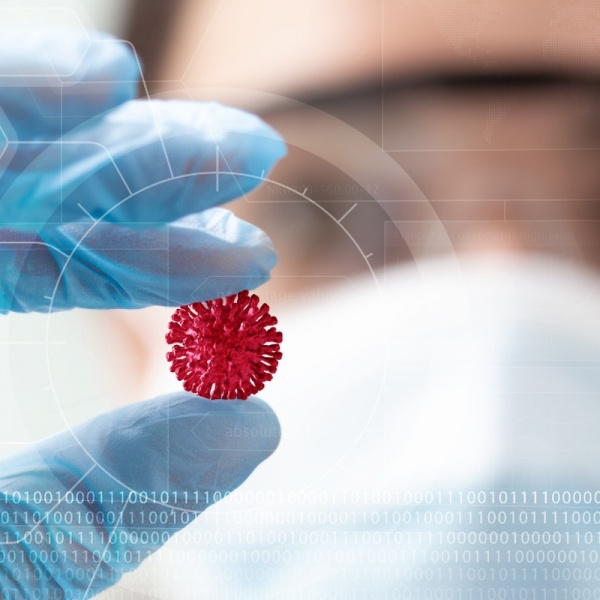
Informational Resources

My Pandemic Story
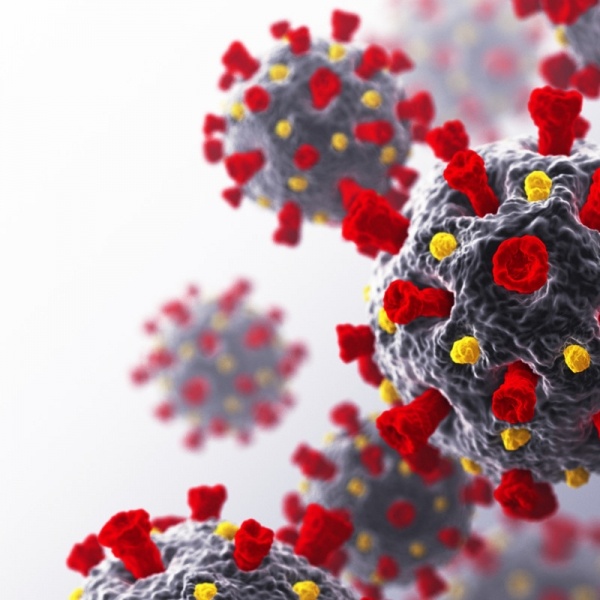
FAQs

Mind & Self-Care

Inspiration
Find Hope

Remember A Loved One
Blessed are those who mourn

Acts of Prayer
United & devoted steadfastly to prayer

Ministry Tools
Share Hope
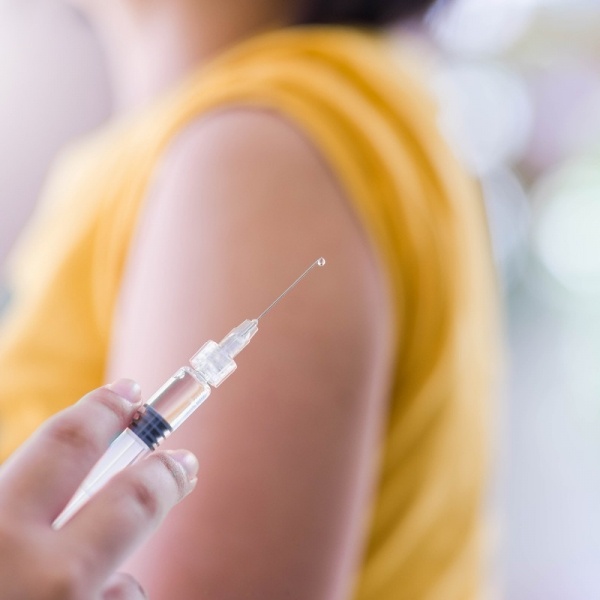
Vaccine Exemptions

Early Adventist Writings
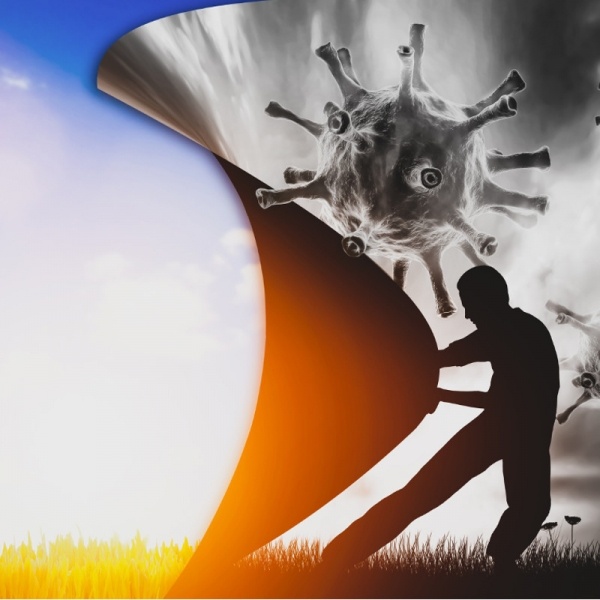
Webinars
Revealing the Light
